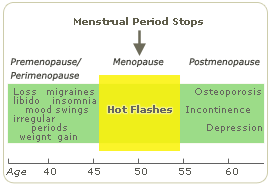34 MENOPAUSE SYMPTOMS |
HEALTH CENTER |
|
LEARN MORE |
|||||||||||||||||||||||||||||||||||||||||||||||
| Menopause | |||||||||||||||||||||||||||||||||||||||||||||||
| Symptoms | |||||||||||||||||||||||||||||||||||||||||||||||
| Herbs for Menopause | |||||||||||||||||||||||||||||||||||||||||||||||
|
|||||||||||||||||||||||||||||||||||||||||||||||
|
|||||||||||||||||||||||||||||||||||||||||||||||
|
|
Menopause Stages, different for each women |
|
||
Traditional Treatments for the Stages of Menopause The majority of women going through the first stages of peri-menopause and menopause usually opt for hormone replacement therapies. It is therefore best to always consult one's doctor of what dosage and what form of therapy is best for you. Hot flashes For women experiencing bouts of hot flashes, it is usually recommended they use small doses of hormone replacement therapy (HRT) at various stages as hot flashes are usually temporary and disappear soon after the menopause stage. Hot flashes are usually a short term problem between the perimenopausal and final menopausal stages and don�t generally require high doses of hormone replacement treatments. Mood swings Mood swings are also shown to be associated to a woman's menopausal stages as her body experiences an array of erratic fluctuations on all degrees. Yet, there is no conclusive evidence linking menopause as a cause for erratic behavior and mood swings. Mood swings can be motivated by various other reasons during menopause such as the physiological toll the body experiences in these stages and the emotions having to be dealt with it so spontaneously. Other reasons include the social stigmas regarding the women's life stages of menopause and can have an impact on her psychological state. Incontinence Women experiencing any form of incontinence during the menopause should be wary of hormone replacement therapies as it has shown to worsen this symptom. At the same time the oestrogen has shown to decrease the risk of urinary tract infections. Also noted is that women who still have their uterus during the menopause stages must not take treatments with progesterone treatments. Chronic diseases during menopause Taking hormone replacement therapies for women who have or had chronic illnesses are not advised as it is shown to worsen it. An intake of oestrogen is shown to increase the rate of strokes, deep vein thrombosis, gall bladder disease, breast cancer and possible dementia. This is due to the fact that oestrogen tends to constrict blood vessels and thus causing a slow blood flow which can result in potential clotting that could lead to the above mentioned consequences. Osteoporosis Although strong evidence has proven that hormone treatment decreases the risk of low bone density occurring in women and has shown to maintain density over time. Osteoporosis treatment in particular is not advised for women experiencing the symptoms of the life stages of menopause especially over the long term. Bisphosphonates are recommended instead, which are high in calcium and vitamin D compounds for first time patients wanting to treat bone density problems especially in the time of menopause. Lack of libido Lack of libido is reported to be a common symptom amongst women in their menopause stages. Research conducted has shown menopause does not link to being a cause to low libido and is often caused by psychological problems instead. Testosterone is given in HRT especially for women who have had a hysterectomy as well in various doses in HRT treatment for women going through menopause and who have had a hysterectomy. Many countries do not give out testosterone in HRT. Testosterone is shown to increase women's libido, but check with your doctor to see about implementing it as a treatment. Starting therapy Before embarking on any hormonal therapy you should have a complete test so the doctor can figure out the best form of treatment just for your needs and symptoms. | ||
|
||
Alternative Treatments for the Stages of Menopause
There have proven to be various relief symptoms of the menopause problems without the use of HRT and prescribed clinical medications. These include:
Taking alternative medicines such as herbal remedies and mineral solutions does not necessarily mean it is safe for everyone. The compound structure and properties of various herbs also affects ones hormone and body functioning just as treatments prescribed from laboratories. Herbs and minerals can have just as much side effects as any medicinal compounds that are created in laboratories. It is best to consult a professional practitioner or herbalist to suggest the correct herbal treatments for you and the best way to take the treatments. By Natural-Progesterone-Estrogen-Supplements.com |
| Back to Home: | 34 Menopause Symptoms |  |
| Copyright� 2008 - Menopause Stages - All Rights Reserved |

